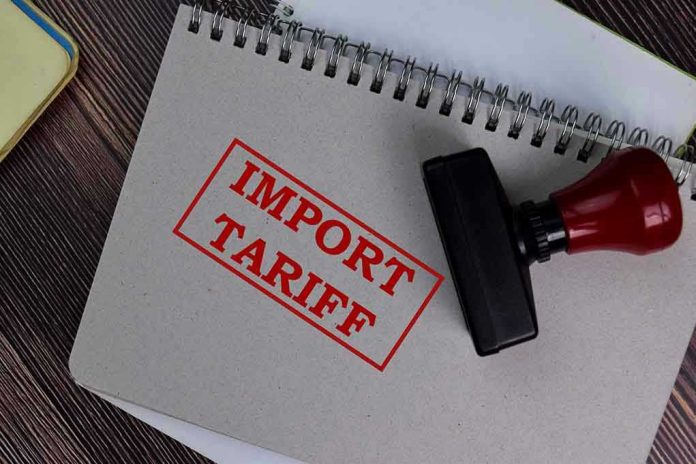
President Trump’s threat to unleash tariffs and restrict U.S. technology exports on nations imposing digital taxes signals a fierce new front in the fight to protect American innovation from foreign overreach.
Story Snapshot
- Trump vows tariffs and export controls on countries targeting U.S. tech with digital taxes, escalating trade tensions.
- European and Canadian digital tax regimes are accused of discriminating against American companies while letting Chinese firms off the hook.
- Canada rescinded its digital tax after U.S. threats, but key European nations remain defiant amid ongoing negotiations.
- The standoff raises concerns over global technology supply chains, U.S. economic security, and the future of digital commerce.
Trump’s Ultimatum: Defending U.S. Tech from Foreign Tax Grabs
President Trump issued an unmistakable warning to foreign governments levying digital services taxes on U.S. technology giants. Declaring these taxes a targeted assault on American companies, Trump announced that the U.S. would impose tariffs and restrict exports of advanced technologies—including semiconductors—against any nation refusing to rescind these measures. The ultimatum, delivered directly via presidential social media, targets mainly European states and Canada, whom Trump accuses of exempting Chinese competitors while unfairly burdening American innovators. This strong-arm approach has injected new urgency into ongoing trade negotiations and sharp debate about the future of global digital commerce.
Trump’s threats come after years of escalating tensions over digital taxation. Many European countries and Canada have enacted digital services taxes, arguing that U.S. tech corporations like Google, Meta, Apple, and Amazon exploit loopholes to avoid paying their fair share. These taxes are typically levied on revenues rather than profits and apply almost exclusively to American firms. The U.S. government, under both Trump and previous administrations, has long argued that these taxes violate international trade norms and single out American enterprise for political and economic gain. The president’s most recent ultimatum explicitly links retaliatory tariffs and semiconductor export controls to the removal of digital taxes, a move that raises the stakes for all parties involved.
International Response: Allies Divided, Canada Retreats Under Pressure
The global reaction to Trump’s strategy has been mixed and often tense. Canada, facing the threat of suspended trade talks, abruptly rescinded its digital services tax in June 2025, underscoring the real leverage of U.S. economic power. However, European governments—particularly France, Italy, and Spain—continue to defend their digital tax regimes, insisting they are necessary to ensure fair taxation in the digital age. A joint U.S.-EU statement on August 21, 2025, signaled a willingness to negotiate, but no final compromise has emerged. Trump’s critics argue that these measures risk igniting a broader trade war, but supporters see a necessary stand to protect American jobs, innovation, and sovereignty from international intrusion.
Chinese tech firms, though not directly targeted by new European taxes, are often cited by the Trump administration as beneficiaries of “regulatory leniency,” raising further concerns about global competitiveness and the security of U.S. technology. The U.S. is also leveraging its dominance in semiconductor manufacturing as a bargaining chip, threatening to reshape global supply chains if foreign governments do not relent. This approach, while controversial, aims to restore leverage lost under prior administrations that conservatives argue were too quick to concede to international demands at the expense of American interests.
Risks and Implications: Trade War Concerns, Economic Security, and Conservative Values
Trump’s tariff threats, if enacted, could disrupt global supply chains and raise prices for consumers worldwide. Many experts warn of the collateral damage a trade war could inflict—not just on foreign economies but also on American families, businesses, and workers. Industry leaders within the U.S. tech sector largely support efforts to combat discriminatory taxes but remain wary of escalating retaliation that could limit market access or spark countermeasures. Some economists and legal scholars caution that unilateral tariffs may violate international trade agreements, potentially inviting further disputes and retaliatory penalties.
Trump Threatens Tariffs For Nations With Digital Taxes On US Tech
The president said other countries’ digital taxes and regulations were "all designed to harm, or discriminate against, American Technology."
TUE AUG 26, AT 8:50 AMhttps://t.co/c7kw1f4zAs
— Williams Kris (@kris_willi28289) August 26, 2025
For Trump’s conservative base, however, the confrontation embodies a commitment to defending U.S. sovereignty, economic power, and constitutional values against foreign overreach and globalist agendas. The administration’s willingness to leverage tariffs and export controls is seen as a necessary corrective to years of perceived weakness, protecting American innovation and jobs from targeted international taxation. While the future of digital commerce hangs in the balance, the message is clear: the U.S. government, under Trump’s leadership, will not tolerate economic discrimination or threats to its technological edge.
Expert Perspectives: Weighing the Costs and Merits of Trump’s Strategy
Policy analysts and lawmakers remain divided on the long-term effects of Trump’s approach. Critics like Senator Rand Paul contend that tariffs ultimately punish domestic consumers, potentially raising costs at home rather than changing foreign government behavior. Others argue that the threat of tariffs is a legitimate tool to force a fairer international tax system and deter coordinated attacks on American interests. The technology sector’s future may depend on whether allies can find common ground—or whether this standoff signals a new era of digital protectionism and economic nationalism. With negotiations ongoing and no immediate resolution in sight, U.S. tech companies and their employees remain caught in a climate of heightened uncertainty and political brinkmanship.
Sources:
Trump Vows Retaliation Against Countries With Digital Rules Targeting U.S. Tech (ABC News)
Trump Issues Ultimatum, Threatening Tariffs Over Digital Taxes, Regulations (Fox Business)







